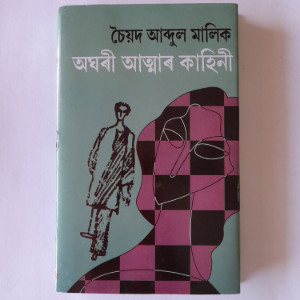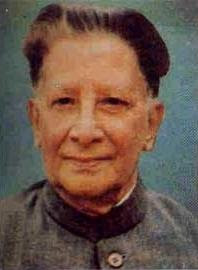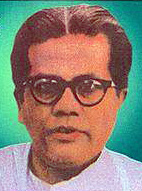Syed Abdul Malik was a prominent and highly esteemed figure in Assamese literature. Born on January 15, 1919, in Naharani Village, Golaghat district, he was the son of Syed Rahmat Ali and Syeda Lutfun Nissa. Malik began his writing journey at a young age, with his first novel, La Sa Gu, serialized in the monthly magazine Banhi during 1945-46.
Greatly influenced by literary giants Anton Chekhov and Guy de Maupassant, Malik masterfully crafted a wide range of characters and skillfully brought them to life in his works. His other notable collections include Parasmani, Ajani Natun Suwali, Rangagara, and Moraha Papari. Starting his career in the early 1940s, Malik enriched Assamese literature with an impressive body of work, including novels, short stories, and poetry, over a span of more than five decades. In terms of sheer output, Malik was unmatched, contributing significantly to the growth of Assamese literature.
Malik’s short stories can be broadly divided into two categories: romantic tales and those reflecting social consciousness. What sets his work apart is the vast array of experiences he weaves into his narratives. His stories are both deep and diverse, exploring a wide variety of themes and backgrounds. Malik thoroughly examined society, capturing its essence and projecting it vividly in his writing, earning recognition for the broad thematic range of his stories.
Technically, Malik’s stories are rich and intricate. He was a gifted storyteller, known for his compelling character creation and plots that often carried elements of suspense. Notable stories include Pran Haruar Pisat, and Barakharar Barasun, which addresses economic struggles and dignity. His works frequently deal with social issues and economic hardship, always infused with passion. For instance, Bibhatsa Bedana delves into social consciousness, though it sparked controversy due to its sexual themes. Malik is credited as the pioneer of introducing the “Chekhovian atmosphere” in Assamese literature.
Early Life and Education
Birth and Early Years in Naharani Village, Golaghat District, Assam
Syed Abdul Malik was born in the serene village of Naharani in Golaghat district, Assam. This picturesque setting, with its lush greenery and tranquil environment, played a significant role in shaping his early life and literary sensibilities. Growing up in a close-knit community, Malik was deeply influenced by the rich cultural heritage and oral traditions of Assam.
Educational Background and Influences
Malik’s educational journey began in local schools where he exhibited a keen interest in literature and the arts from a young age. His formal education continued at Cotton College in Guwahati, where he was exposed to a broader spectrum of literary works and ideas. The intellectual environment at Cotton College, combined with the mentorship of his teachers, nurtured his burgeoning literary talent. Influences from both Assamese and global literature began to shape his unique voice.
Early Literary Interests and Inspirations
From an early age, Malik was captivated by the power of storytelling. The folk tales and legends of Assam, narrated by village elders, left a lasting impression on him. As he delved deeper into literature, he found inspiration in the works of Rabindranath Tagore, Sarat Chandra Chattopadhyay, and other literary giants. These early influences fueled his passion for writing and laid the foundation for his prolific literary career.
Literary Career
Start of His Literary Journey in the Early 1940s
Syed Abdul Malik embarked on his literary journey in the early 1940s, a period marked by significant socio-political changes in India. His initial works reflected the cultural and social milieu of Assam, capturing the essence of rural life and the struggles of common people. His debut writings quickly garnered attention for their authenticity and emotional depth.
Major Works and Genres

Malik was a versatile writer, contributing to various literary forms including novels, short stories, poetry, and essays. Some of his most acclaimed novels include “Aghari Atmar Kahini” and “Umola Ghoror Dhuli,” which are celebrated for their intricate storytelling and profound character development. His short stories often explored human emotions and societal issues, while his poetry and essays provided insightful reflections on life and culture.
Notable Themes and Styles in His Writing
Malik’s writing is characterized by its rich portrayal of Assamese culture and traditions. He often delved into themes of love, loss, and the human condition, using a narrative style that was both evocative and accessible. His works are known for their “Chekhovian atmosphere,” blending realism with a deep sense of empathy for his characters. Malik’s ability to weave complex emotions into simple narratives made his writing resonate with a wide audience.
Major Works
Detailed Discussion of Significant Novels
Syed Abdul Malik’s novels, such as “Aghari Atmar Kahini” and “Umola Ghoror Dhuli,” stand out for their deep exploration of human emotions and societal issues. “Aghari Atmar Kahini” delves into the complexities of human relationships and the struggles of the marginalized, while “Umola Ghoror Dhuli” paints a vivid picture of rural Assamese life, highlighting the cultural and social dynamics of the time. These novels are celebrated for their rich character development and evocative storytelling.
Analysis of His Short Stories and Their Impact
Malik’s short stories are known for their poignant portrayal of everyday life and the human condition. His ability to capture the essence of Assamese culture and the intricacies of human emotions made his short stories resonate deeply with readers. Stories like “Xorai” and “Potharor Kotha” not only entertained but also provoked thought and reflection on societal norms and personal values. His short stories often served as a mirror to society, reflecting its virtues and vices with equal clarity.
Contributions to Poetry and Other Literary Forms
In addition to his novels and short stories, Malik made significant contributions to Assamese poetry and essays. His poems, often lyrical and introspective, explored themes of love, nature, and existential musings. His essays provided insightful commentary on cultural, social, and literary topics, showcasing his versatility as a writer. Malik’s diverse body of work enriched Assamese literature and provided a comprehensive view of his literary prowess.
Awards and Recognitions
Syed Abdul Malik’s contributions to literature were widely recognized and celebrated. He was honored with the prestigious Sahitya Akademi Award for his outstanding literary achievements. His contributions were further acknowledged with the Padma Shri and Padma Bhushan awards, reflecting his significant impact on Indian literature. These accolades not only recognized his talent but also cemented his legacy as a towering figure in Assamese literature.
Role in Assamese Literary Organizations
Presidency of Asam Sahitya Sabha in 1977
In 1977, Syed Abdul Malik was elected as the president of the Asam Sahitya Sabha, one of the most prestigious literary organizations in Assam. His presidency, held at Abhayapuri, was marked by efforts to promote Assamese literature and culture on a broader scale. Malik’s leadership was instrumental in fostering a sense of unity and purpose among Assamese writers and intellectuals.
Contributions to Literary Societies and Cultural Organizations
Beyond his role in the Asam Sahitya Sabha, Malik was actively involved in various literary societies and cultural organizations throughout his life. He played a key role in organizing literary events, workshops, and seminars that provided a platform for emerging writers to showcase their talents. His dedication to nurturing literary talent and promoting Assamese culture was evident in his tireless work with these organizations.
Influence on Contemporary Assamese Writers
Syed Abdul Malik’s influence extended far beyond his own literary works. As a mentor and guide, he inspired a generation of contemporary Assamese writers. His emphasis on authenticity, cultural richness, and emotional depth in writing set a standard for others to follow. Many modern Assamese authors credit Malik’s guidance and encouragement as pivotal in their literary journeys. His legacy continues to shape the landscape of Assamese literature today.
Conclusion
Syed Abdul Malik stands as a monumental figure in Assamese literature, whose contribution spanned over five decades. His mastery of storytelling, depth of characters, and wide thematic range, from romanticism to social realism, left an indelible mark on the literary landscape. Malik’s works not only enriched Assamese fiction but also introduced new literary techniques, notably the “Chekhovian atmosphere,” into the regional narrative. Through his vivid portrayal of human experiences and social issues, he remains a pivotal voice in Assamese storytelling, inspiring generations to come.
FAQ’s
Q. Who was Syed Abdul Malik?
A: Syed Abdul Malik was a renowned Assamese writer known for his contributions to Assamese literature through his novels, short stories, and poetry. He is recognized as one of the most influential literary figures in the region.
Q. When and where was Syed Abdul Malik born?
A: Syed Abdul Malik was born on January 15, 1919, in Naharani Village, Golaghat district, Assam.
Q. What are some of Syed Abdul Malik’s notable works?
A: Some of his notable works include Parasmani, Ajani Natun Suwali, Rangagara, Moraha Papari, and Pran Haruar Pisat.












